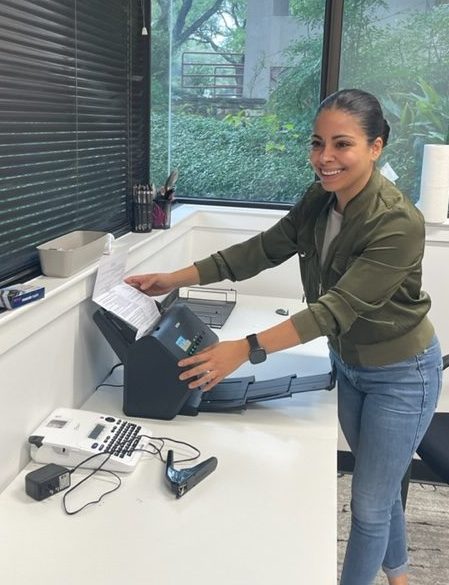Starting a Business in San Antonio
How to Start a Business in San Antonio, Texas
Every business in San Antonio is a little different, so the process for starting a San Antonio business will vary by your business structure—sometimes with a few extra requirements for certain industries. Use our guide for simplified steps to launching your new business in The Alamo City, whether it’s a small sole proprietorship, large corporation, or anything in between.
- Where Do I Register My San Antonio Business?
- How Do I Register with the SoS or County Clerk?
- Is a San Antonio DBA Necessary?
- Do I Need a San Antonio Business License?
- How Do I Get a Texas Sales Tax Permit?
- What is a San Antonio Property Tax Rendition?
- Do I Need an EIN?

Where Do I Register My San Antonio Business?
In San Antonio, any company doing business must be registered to do so with the Texas Secretary of State, or the Bexar County Clerk.
- Incorporated businesses like LLCs or corporations are formed at the state level.
- Unincorporated businesses, like sole proprietorships and general partnerships register at the local county level.
Should my San Antonio business be incorporated or unincorporated?
Overall, incorporated business offer more protections but come at a greater cost.
- Incorporated businesses include common business structures like LLCs and corporations. Texas incorporated business go through the legal process of becoming a separate legal entity by registering with the state and adhering to state-specific regulations and requirements. Once incorporated, incorporated businesses gain limited liability protection, as well as state business name protection, and can conduct its operations, enter contracts, and own assets under its own legal identity. However, with additional protections come additional administrative filings and fees. Initial registration is more expensive to incorporate, and incorporated businesses should also expect to file an annual Public Information Report.
- Unincorporated businesses include business structures like sole proprietorships and general partnerships. In San Antonio, these business only register their business name with the county clerk, rather than the secretary of state. As they do not go through the formal process of creating a separate legal entity recognized by the state of Texas, the business owner(s) retain personal liability for the company’s debts and legal obligations. Although there are less protections for the owner(s), it’s less expensive to register with the county and there is less frequent maintenance for the registration of an unincorporated business.
How Do I Register with the SoS or County Clerk?
Registering with the Texas Secretary of State
To register your business in the state of Texas and form an incorporated business of any type, you’ll need to file with the Texas Secretary of State. The most common business structures have a $300 formation filing fee, but rates vary based on the entity type you form as follows:
| Business Type | State Fee |
| Limited Liability Company (LLC) Corporation Professional Limited Liability Company (PLLC) Professional Corporation (PC) | $300 |
| Professional Association Limited Partnership (LP) | $750 |
| Nonprofit Corporation Cooperative Association | $25 |
| Limited Liability Partnership (LLP) Limited Liability Limited Partnership (LLLP) | $200 per member |
Some business owners, such as veterans, may qualify for reduced or reimbursed filing fees, and you can also visit Texas Economic Development for information about other business incentives.
To incorporate your business in Texas, you can file online on the SOSDirect website, or, you can hire us to file your Texas LLC or Texas corporation for you. We’ll serve as your registered agent, include a business address for use on public filings, give you access to an online forms library and much more.
Registering with a County Clerk’s Office
In San Antonio, or anywhere in Bexar County, unincorporated businesses register directly with the Bexar County clerk by filing an assumed name (DBA) certificate. An unincorporated business is a type of business like sole proprietorships (one owner) and general partnerships (multiple owners) that operate without going through the formal process of becoming a separate legal entity recognized by the state. Operating under unincorporated business structures generally means the business owner(s) retain personal liability for the company’s debts and legal obligations, but has lower filing fees than incorporated businesses.
To register an unincorporated business with Bexar County, you’ll follow these steps:
- Check name availability. Assumed names/DBAs are not protected in Bexar County, so it is the business owners’ responsibility to check the County Clerk’s Official Records Search to ensure your business name it not already in use. Please note, other businesses may still duplicate your business name later or in other Texas counties.
- Complete and notarize the Assumed Business Name (DBA) Certificate. If your business name is available, you may complete the assumed name form. The form is straightforward and only one page long; however, the form must be notarized before it can be submitted. All business owners must sign the document before a notary in order for the certificate to be filed with the County Clerk’s office. Assumed Name Certificates may be acknowledged by a deputy in the County Clerk’s Office for a fee of $1.00 or notarized by a notary public of choice.
- Submit form. Once your Assumed Business Name (DBA) Certificate is complete and notarized, you may submit the form with the appropriate fee online, or by mail/in-person to the county clerk’s office in the Bexar County Courthouse, 100 Dolorosa, Ste. 104, San Antonio, TX 78205.
| Registration Fee Type | County Fee |
| Bexar County Assumed Name Certificate | $14.00 + $0.50/additional owner |
| Certified Copy (recommended) | $7.00 |
| Notary fee at clerk’s office | $1.00 |
Is a San Antonio DBA Necessary?
Unincorporated San Antonio businesses must register a DBA or assumed name with the county where the business premise is maintained. If there is no business premise, then the appropriate assumed name certificate should be filed in all the counties the business is operating under the assumed name. Unincorporated businesses may register multiple DBAs for their business in Bexar County, but will need to register a separate assumed name form for each DBA.
Incorporated San Antonio businesses only register with the secretary of state and do not file a DBA with the county, including if the incorporated business chooses to also have DBAs for the state-registered business name. Texas DBAs for LLCs, corporations, and other incorporated businesses should be filed after the business is formed by using the Texas Secretary of State Assumed Named Certificate which has a $25 filing fee.
Do I Need a San Antonio Business License?

There is no general business license in San Antonio. However, the city does require specific business licenses for some industries. Contact the City of San Antonio for confirmation on whether your business required a special license, but some common required business licenses include:
State of Texas Licensing & Permits
State regulated industries from breweries to banks must follow state requirements so check the Texas Business Licenses and Permits Guide for your industry. Extra paperwork and rules are never the most exciting part of starting a new business, but the guide is alphabetical by industry and includes a comprehensive list of each license and/pr permit a new business in that industry needs.
How Do I Get a Texas Sales Tax Permit?
Whether incorporated or unincorporated, all Texas businesses engaged in business in Texas, selling or leasing tangible personal property in Texas, or selling taxable services in Texas, must obtain a Texas Sales Tax Permit by filing a Sales Tax Permit Application with the Texas Comptroller.
In order to apply for a Texas Sales Tax Permit, you’ll need a NAICS code, and your tax ID.
- NAICS code. A 6 digit numerical code that reflects your business’s primary operations or industry. You can find the right code for your business by searching codes on the NAICS website.
- Tax ID. Your tax ID will depend on your business type. If your business has a sole owner, you’ll need a social security number. Corporations need social security numbers for each officer or director. Partnerships need either a social security number or EIN from each partner.
Incorporated businesses will also need to include their Texas Comptroller File Number on their application. File numbers can be found on the Texas Comptroller Business Search.
There is no fee to apply for a Texas Sales Tax Permit, but it will definitely cost you to skip this step. Per Texas Law, operating without a sales tax permit is a crime punishable by a fine of up to $500 for each day a business operates without a permit.
What is a San Antonio Property Tax Rendition?
Required by the State of Texas, but paid to the local county tax department, a property tax rendition is a list of your business’s taxable personal property that you file each year. San Antonio businesses will filed their Personal Property Tax Rendition to the Bexar Appraisal District.
The filing period is January 1st to April 15th listing the property of the previous year. Bexar County provides a new form each year, but the updated form can typically be found on the Property Tax web page in the Tax Resources on the right. Businesses should expect to list assets including inventory, raw materials, improvements, machinery and equipment, furniture, fixtures, computer equipment, and vehicles used for business purposes.
Do I Need an EIN?
A Federal Employer Identification Number (generally called an EIN or Tax ID) is assigned to businesses after an application to the IRS, and most likely, yes, your business will need one. Regardless of the size or industry of your San Antonio business, or whether it’s incorporated or unincorporated, you will typically need an EIN to handle basic business operations like file company taxes, open a business bank account, or hire employees.
You can apply for your company’s EIN directly from the IRS at no cost.